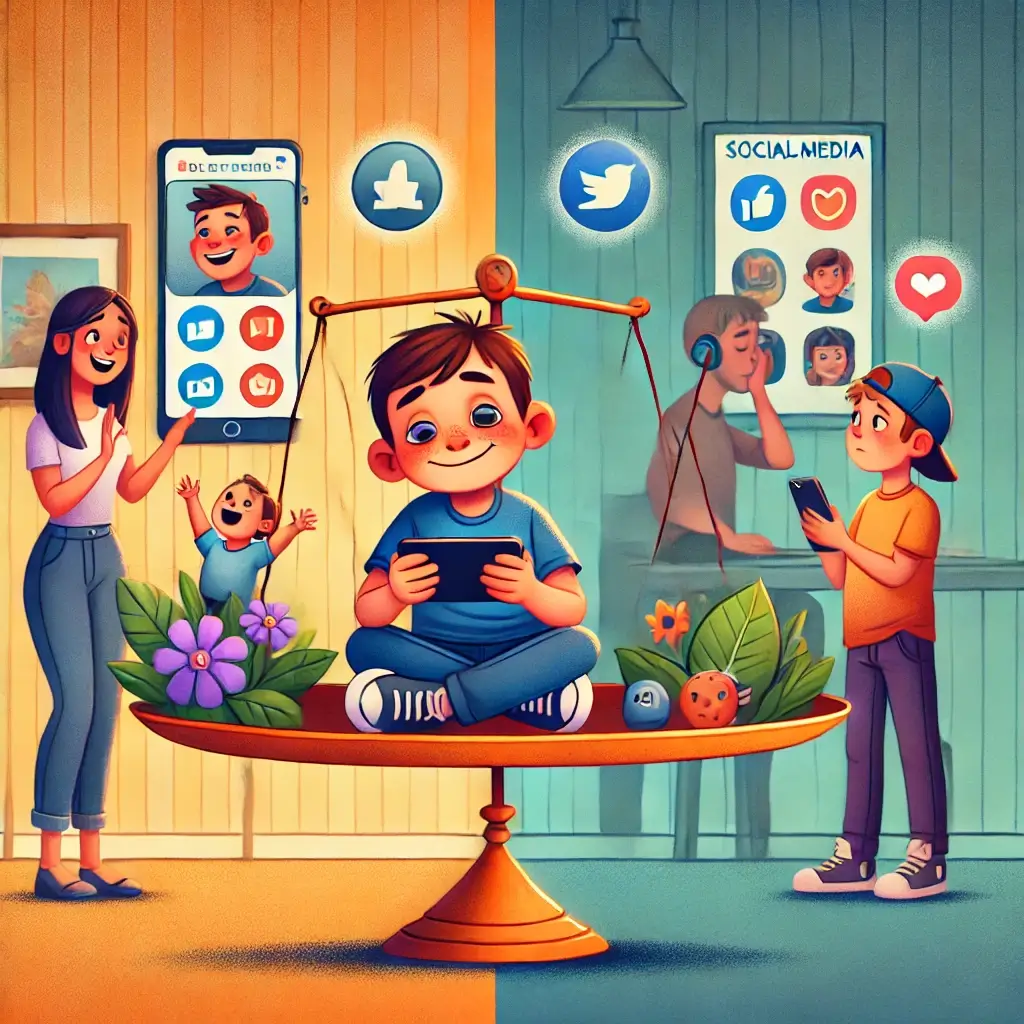The Double-Edged Sword: Cell Phones and Children’s Development
It is a complicated and continuous research subject to investigate how mobile phone use affects children’s social and emotional development. An outline of some potential advantages and disadvantages to take into consideration is as follows:
Unlocking the Potential: Positive Impacts of Cell Phones
Through cell phones, children can maintain social connections with their friends and family, particularly those who reside a considerable distance away. Messaging applications and video call technology can improve social relationships and communication.
When it comes to social learning, a few apps and online platforms can offer instructional content on topics such as social skills, emotional intelligence, and effective ways to navigate social settings.
Self-Expression: Children can use their cell phones as creative outlets to express themselves through activities such as taking photographs, making music, or posting on social networking platforms (provided an adult supervises them).
Information and Education: Cell phones give users access to a vast amount of information and educational materials, which can be beneficial to learning and development.
The Dark Side: Potential Drawbacks of Cell Phone Use
An addiction to screen time: Excessive time spent in front of a screen can negatively impact a child’s general well-being and physical development. Youngsters who spend an excessive amount of time in front of digital devices may lose out on other activities that are necessary for their development and education.
One of the key worries is that excessive screen time might disturb a child’s play time, which is one of the primary issues. Play is essential for a child’s cognitive, social, and emotional development. Play can take many forms, including imaginative games, physical activities, or positive social relationships.
When children spend more time in front of screens than they do playing, they miss out on opportunities to acquire critical abilities such as problem-solving, creativity, and teamwork.
Excessive time spent in front of a screen might also make it more difficult to engage with other people in person. For children to develop good social and communication skills, they need to interact with fellow children, members of their family, and other caregivers.
When children are continually engrossed in digital gadgets, they have fewer opportunities to practice and improve these essential interpersonal skills, which can affect their social and emotional development.
Another key problem associated with this issue is the influence that excessive screen time has on a child’s sleep patterns. Blue light, which is released by digital screens, has the potential to disrupt the body’s natural sleep-wake cycle, making it more difficult for children to fall asleep and less likely that they will obtain the recommended amount of quality sleep.
Insufficient sleep can have far-reaching implications, such as reduced cognitive function, mood changes, and even physical health concerns.
The conclusion is that an addiction to screen time can be a substantial obstacle to a child’s overall development process. Parents and other caregivers can assist children in flourishing and reaching their full potential by reducing the amount of time they spend in front of screens and creating a balance between digital activities and necessary experiences.
Navigating the Digital Minefield: Cyberbullying and Social Media Pitfalls
The unfortunate reality is that online environments can serve as fertile ground for the development of cyberbullying. Children are at risk of being subjected to harmful messages, social exclusion, or harassment when they are online.
Social comparison and self-esteem: Social media platforms frequently present idealized portrayals of lives, which can lead to children engaging in social comparison and possibly experiencing emotions of inadequacy. This might badly impact self-esteem and body image.
Inability to Interpret Social Indicators An excessive reliance on texting and online communication can make it more difficult for children to understand facial expressions, body language, and other nonverbal indicators essential for social interaction.
Distracted Attention: Children may find it challenging to concentrate on conversations, in-class instruction, or activities that take place in the real world due to constant notifications and the temptation of games and social media.
Problems with Sleep: The blue light released from screens has the potential to disrupt sleep patterns, resulting in feelings of weariness, irritation, and difficulties concentrating, all of which can further hinder engagement with others.
Striking a Balance: Responsible Cell Phone Use for Children
Regarding age-appropriate use, the American Academy of Pediatrics (AAP) suggests that children younger than 18 months should not spend time in front of a screen. When it comes to older children, it is important to establish clear standards and time limitations for their phone usage.
Monitoring of Content: Pay attention to the content your child accesses online and use parental controls to prevent them from accessing websites and applications deemed unsuitable.
Open Communication: Discuss with your child the importance of cyberbullying, internet safety, and responsible social media usage. Encourage open conversation to help them feel comfortable reporting any negative experiences they may have had while using the internet.
Be conscious of how you use your phone around your child and set an example for them to follow. Take time from your phone to engage in activities, chats, and meals with your family.
Encourage Alternatives: Encourage alternative activities such as playing outside, spending time with friends and family in person, participating in hobbies, and pursuing creative interests.
It is crucial to remember that mobile phones can be a useful tool; however, it is essential to develop good habits and the ability to use them responsibly to limit the possible negatives and maximize the benefits for your child’s social and emotional development.

